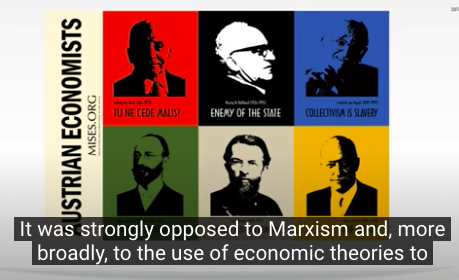I have read some books of Friedrich Hayek and Ludwig von Mises, great minds. There are "Hayek" series in this blog, latest is Hayek 12: Friedrich Hayek's 20th Death Anniversary (March 26, 2012).
A good brief discussion from
Austrian School of Economics: Founders, Key Ideas, and Insights
By MARY HALL Updated July 28, 2021
Reviewed by ROBERT C. KELLY
https://www.investopedia.com/articles/economics/09/austrian-school-of-economics.asp
KEY TAKEAWAYS
Carl Menger, an Austrian economist who wrote Principles of Economics in 1871, is considered by many to be the founder of the Austrian school of economics.
The key ideas of the Austrian school have evolved over the years through the input of various economists.
Other than Carl Menger, the Austrian school also includes names like Ludwig von Mises, Eugen von Bohm-Bawerk, and Friedrich Hayek.
The Austrian school uses logic of a priori thinking to discover economic laws of universal application, whereas other mainstream schools of economics make use of data and mathematical models.
The early concepts of the Austrian school contributed significantly to the theory of diminishing marginal utility.
---------
And a longer discussion,
Austrian School of Economics
By Peter J. Boettke
https://www.econlib.org/library/Enc/AustrianSchoolofEconomics.html
The Science of Economics
Proposition 1: Only individuals choose.
Proposition 2: The study of the market order is fundamentally about exchange behavior and the institutions within which exchanges take place.
Proposition 3: The “facts” of the social sciences are what people believe and think.
Microeconomics
Proposition 4: Utility and costs are subjective.
Proposition 5: The price system economizes on the information that people need to process in making their decisions.
Proposition 6: Private property in the means of production is a necessary condition for rational economic calculation.
Proposition 7: The competitive market is a process of entrepreneurial discovery.
Macroeconomics
Proposition 8: Money is nonneutral.
Proposition 9: The capital structure consists of heterogeneous goods that have multispecific uses that must be aligned.
Proposition 10: Social institutions often are the result of human action, but not of human design.
---------
These are the key thought leaders of Austrian economics.
A good short video,
What is Austrian Economics?
https://www.youtube.com/watch?v=MxK8FKU3BPs
The Methodology of the Austrian School of Economics
https://www.youtube.com/watch?v=gzH8KVAEkBU
---------------
Pol Ideology 82, Reflections of a former Marxist on property, December 18, 2021
Pol. Ideology 83, The end of liberalism and return of militarist-protectionism? April 12, 2022
Pol. Ideology 84, Capitalism and prosperity, June 28, 2022.


No comments:
Post a Comment